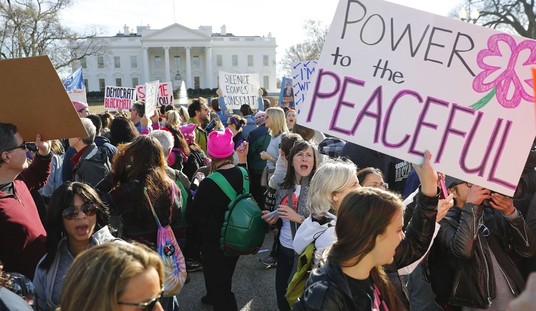Several dozen tea party members demonstrated outside some of Rubio’s Florida offices on Tuesday to protest the comprehensive immigration bill that Rubio and seven Senate colleagues announced this week, which includes a path to citizenship for up to 11 million immigrants in the country illegally.
At one event in Palm Beach Gardens protesters held signs reading, “Stop the Senate!!” and “No Amnesty for Undocumented and Illegal.” Rubio, elected with strong tea party support, has been considered an instrumental lawmaker in the development of the 844-page immigration proposal.
“We’re not condemning Senator Rubio, but we’re concerned about the direction his immigration bill is going, and especially about the fact that there was no public input,” said Jim McGovern, 65, a member of The Martin 9/12 Committee, a tea party group. “There was no debate. This was all done behind closed doors. This violated his campaign promise saying he would support no bill that took more than 25 pages to describe.”
“Over the course of the next week, the Senate Judiciary Committee will hold two hearings on a forthcoming, bipartisan proposal to reform the Nation’s broken immigration system,” Leahy said in a statement. “I look forward to reviewing the bill, holding prompt hearings on the legislation, and proceeding to debating and marking up legislation on this important issue.”…
Sessions was dubious about the hearing announcement Monday.
“Chairman Leahy’s decision to now hold two hearings in two days — on one Friday, one on Monday — is only further proof of the Majority’s desire to rush this bill with minimum public scrutiny,” he said in a statement. “We are talking about legislation that will impact virtually every aspect of our society, reshape our entire immigration system, introduce at least 30 million new foreign workers into the economy, and directly impact every single American worker and taxpayer. … Something is truly broken in Washington when the people, the law enforcement officers who protect them, and the people’s representatives, have less time to review the bill than the special interests who helped write it.”
To recap, in order to get immediate legal status, the only trigger the Obama administration would have to meet is the submission of two strategies to Congress. That’s it. Just a plan for border security. And then, in order for those with legal status to become citizens, DHS must claim that the border is secure. That’s it. There is no way for Congress or a private citizen to challenge a DHS claim that the border is secure. And even if DHS did admit the border was not secure, all that happens is the creation of a Border Commission whose only power is to issue a report on how DHS should spend another $2 billion. No actual border security, our border fence, must be achieved.
None of these “triggers” assures the border will be secure in any way. Any future Democratic administration could simply say the border was secure, regardless of what the facts on the ground are, and U.S. citizens would have no way to hold them accountable.
As NBC Latino reports, “Despite the insistence of tying a path to citizenship to border security, the bill does not use triggers, but instead establishes border security ‘goals.’”
Napolitano has to certify that the Department of Homeland Security is catching nine out of ten of them — a calculation that starts with that total number of illegal crossing attempts.
That’s where the confusion will come in. New ways of surveying the border have shown that the Department has greatly underestimated the number of people attempting to cross any given part of the border. Experimental programs with the new drone-based Vader surveillance system have shown that at least twice as many illegal immigrants crossed the border in some areas as were apprehended. That means the government, which thought it had a pretty high apprehension rate, was actually catching less than 50 percent of illegal crossers.
So now, if the new 90 percent standard becomes law, how would the effectiveness rate be calculated? Would it be 90 percent of the old, pre-Vader estimates of illegal immigrants crossing the border? If so, that would likely mean that in fact the U.S. would be apprehending far less than 90 percent of those actually crossing the border. Or would it be 90 percent of up-to-date Vader-generated numbers, which would suggest that U.S. officials are much closer to capturing nearly all the illegal crossers?
Likewise, the Schumer/Rubio bill requires the Homeland Security secretary to certify that there’s “an electronic exit system at air and sea ports of entry that operates by collecting machine-readable visa or passport information from air and vessel carriers” in order to flush out visa overstayers. But Congress has already required the development of of a biometric entry-exit system (i.e., fingerprints or facial recognition or whatever) rather than the biographic, or paper-based, version the bill calls for. What’s more, current law requires exit-tracking at all entry points, not just airports and seaports, but also land crossings — a requirement passed 17 years ago and re-passed five more times since.
So, the political class has ignored immigration-security requirements passed over the years, and now is promising to water down the requirements it has long ignored. Unbelievable.
The recycling bins of Senate history are filled with well-intended bills that ran into trouble when scored by the CBO. While among the simplest hurdles, the question of how much a piece of legislation costs might be the most difficult to answer. Senators in the gang of eight say the plan will be budget-neutral, using fees to pay for new spending. “We intend to pay for it with fees and not add a burden on the taxpayers,” McCain said…
“It’s not just about the eight of us, if we can’t sell it to a majority of our conferences, then maybe it’s a product not worthy of having been passed,” Graham said. He was making the point that an ideal product would have broad support from Democratic and Republican conferences in the Senate, rather than being the sort of bill that just barely clears the 60-vote hurdle needed to break an expected filibuster. The Republican members made a pitch to members of their conference Monday evening, drawing encouraging words from McConnell and others…
Suppose the Senate ultimately passes an immigration bill with somewhere around 60 votes. As with the gun legislation, the GOP-led House might have little incentive to take up anything similar to the Senate bill. House Judiciary Chairman Robert W. Goodlatte, R-Va., has signaled he may move immigration legislation via a piece-by-piece approach, rather than an all-encompassing measure favored by the Senate group.
Three theories about Marco Rubio:
1) He has made a cold-eyed calculation that the approval of big Republican donors and Rupert Murdoch will matter more than the disapproval of talk radio and the conservative activist base;
2) He got played;
3) He was never really that excited about immigration enforcement in the first place: that message was for 2010, and this is now.
Sharry, the legalization advocate, said he can now see what the negotiators were trying to do on border security.
Rubio can tell conservatives that the border will finally be secured, employers will be required to check the immigration status of their workers, and visa holders will be tracked. But Democrats can say border security benchmarks won’t impede the path to citizenship.
“It is pretty clever,” Sharry acknowledged this week. “They are both right.”
Visit NBCNews.com for breaking news, world news, and news about the economy








Join the conversation as a VIP Member